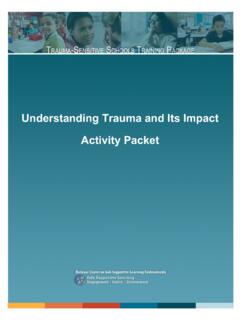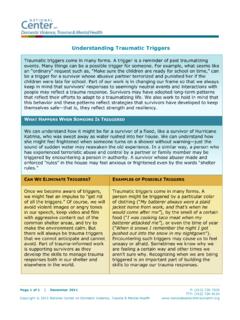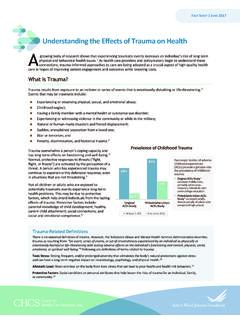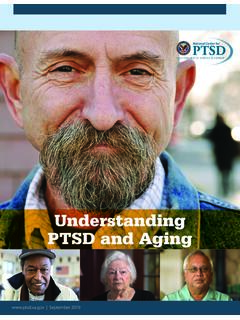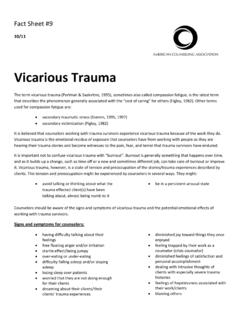Transcription of Understanding Trauma - ppt
1 Understanding Trauma DEFINING Trauma The Na'onal Child Trauma 'c Stress Network[1] defines Trauma as an event or series of events that involve fear or threat. [1] DEFINING Trauma Trauma 'sa'on occurs when both internal and external resources are inadequate to cope with external threat. van der Kolk, 1989 The Furious Fairy , Age 8 At the moment of Trauma , the vic'm is rendered helpless by overwhelming Trauma 'c events overwhelm the ordinary systems of care that give people a sense of control, connec'on, and The severity of Trauma 'c events cannot be measured on any single dimension; simplis'c efforts to quan'fy Trauma ul'mately lead to meaningless comparisons of the salient characteris'c of the Trauma 'c event is its power to inspire helplessness and terror.
2 Herman, 1992 & 1997 Boost Child Abuse Preven'on & Interven'on WHAT CAUSES Trauma ? Trauma 'c events can include experiencing and/or witnessing of: Physical Abuse Sexual Abuse or Sexual Assault Domes'c Violence or a Community Violence Emo'onal Abuse Neglect (Emo'onal or Physical) Parental Mental Health Issues (chronic depression, suicides, ins'tu'onalized parent(s), incarcerated parent(s), addic'ons & substance abuse) Natural disasters (hurricane, fire, flood) Sudden and violent death of a loved one Witnessing a War, Genocide Boost Child Abuse Preven'on & Interven'on WHAT CAUSES Trauma ? Studies have shown that adverse childhood experiences are vastly more common than acknowledged, and that most of these exposures occur with the child's care giving system: About 80% of people responsible for child maltreatment are children's own parents.
3 Van der Kolk, 2005 Boost Child Abuse Preven'on & Interven'on Trauma COMPLEXITY Trauma can happen as: A single event, A reoccurring/strain Trauma , Complex Trauma , Historical/Intergenera'onal Trauma Boost Child Abuse Preven'on & Interven'on ! Children do not have the op'on to report, move away, or otherwise protect themselves they depend on their caregivers for their survival. ! When Trauma emanates from within the family, children frequently experience a crisis of loyalty and organize their behaviour to survive within their families. ! Being prevented from ar'cula'ng what they observe and experience, Trauma 'zed children are likely to organize their behaviour around keeping the secret, deal with their helplessness with compliance or defiance, and accommodate in any way they can to entrapment in abusive or negleceul situa'ons.
4 Boost Child Abuse Preven'on & Interven'on Trauma COMPLEXITY ! A child is faced with an excep'onal complexity when the family environment itself is responsible for the vic'miza'on and the child- caregiver rela'onship becomes the source of Trauma . ! The very people that a child is being agached to are also the people viola'ng the child, and children are likely to suffer not only a disrupted agachment but a disrup'on to all of their developmental systems. ! We are physiologically designed to func'on best as an integrated whole; When many cri'cal developmental competencies are severely disrupted, children become unable to process and/or integrate what is happening. Boost Child Abuse Preven'on & Interven'on Trauma COMPLEXITY Trauma always happens in a developmental context.
5 Boost Child Abuse Preven'on & Interven'on Trauma COMPLEXITY ! Child s experience of different Trauma 'c events will vary on: Age of onset, Severity, Frequency Dura'on, and Extent of injury Boost Child Abuse Preven'on & Interven'on Trauma COMPLEXITY Each age and stage carries its own cri'cal developmental periods; if missed, can be very difficult to compensate. Depending on the age and stage of the onset of Trauma , child s brain development, memory, narra've and verbal capaci'es, will be affected, as well as the child s opportuni'es for recovery. Boost Child Abuse Preven'on & Interven'on Trauma HAPPENS IN A DEVELOPMENTAL CONTEXT The consequences of Trauma 'c event(s) are highly likely to derail child s healthy biological, emo'onal, cogni've and social development.
6 Infants and toddlers are dispropor'onately at risk for maltreatment. Because these early years set the stage for all that follows, they hold the greatest danger for long- term damage, as well as great poten'al for successful interven'on. Boost Child Abuse Preven'on & Interven'on Trauma HAPPENS IN A DEVELOPMENTAL CONTEXT For those children whose Trauma 'c experience becomes the norm rather than the excep'on, the responses to Trauma will interfere with, and/or override, the processes of healthy development. They oken'mes do not have a chance to develop coping skills, a sense of self, or a sense of self in rela'on to others. Boost Child Abuse Preven'on & Interven'on IMPACT OF Trauma ON DEVELOPMENTAL TRENDS The cradle of early development is in the dyadic rela'onship of the caregiver and infant, in which early func'ons of arousal regula'on, social engagement, and cogni've development evolve = ATTACHMENT Boost Child Abuse Preven'on & Interven'on ATTACHMENT !
7 At the biological level = survival ! At the level of mind = crea'ng of internal maps , sense of self, self- regula'on The agachment is the building block of the founda'on of mental health. Boost Child Abuse Preven'on & Interven'on ATTACHMENT What happens when things do not go well : X + Y + Z = the going on being and repair; in case of Trauma , despair. Inves'ga'ons into the physiology of relatedness now tell us that agachment penetrates to the neural core of what it means to be a human being. Lewis, Amini and Lannon (2001) A General theory of Love Boost Child Abuse Preven'on & Interven'on ATTACHMENT ATTACHMENT AND Trauma When Trauma occurs in the presence of a suppor've, if helpless, caregiver, the child s response will largely mimic that of the parent: The more disorganised the parent, the more disorganised the child.
8 The security of the agachment bond mi'gates against Trauma - induced terror. Boost Child Abuse Preven'on & Interven'on ANGER CONFUSION SADNESS WORRY NUMBNESS HURT FEAR BELIEF SHOCK DISBELIEF RAGE! ANXIETY MINIMIZATION DENIAL REVULSION GUILT SHAME BETRAYAL WITHDRAWAL EMBARRASSMENT JEALOUSY DESPAIR SELF- BLAME PANIC DOUBT REVENGE!
9 Boost Child Abuse Prevention & Intervention COMMON REACTIONS TO Trauma COMMON REACTIONS TO Trauma ! It is important to remember that every child is unique, and a number of factors will influence the range of reac'ons the child may or may not experience. ! Children may react to Trauma in a number of different ways including the following symptoms, which can be fluctua'ng in presenta'on: NIGHTMARES PHYSICAL SYMTOMS(difficulty sleeping, ea'ng, headaches, stomach aches; lowered immune system; disrupted toilet training / wetng) HYPERVIGILANCE (chronic physical arousal) DIFFICULTY CONCENTRATING DISSOCIATION Boost Child Abuse Preven'on & Interven'on COMMON REACTIONS TO Trauma AVOIDANCE (staying away from places, people, things that remind them of the Trauma 'c event)
10 ISOLATING oneself from family or friends INTENSE FEAR and WORRYING ANGER INTENSE SADNESS REMEMBERING the Trauma 'c event / FLASHBACKS when seeing, hearing, or smelling something that reminds the child or youth about their experience REENCATMENT expressing fears and elements of Trauma through play SILENCE and/or LOSS OF ACQUIRED COMMUNICATION SKILLS Boost Child Abuse Preven'on & Interven'on COMMON REACTIONS TO Trauma Some'mes situa'ons of inescapable danger may evoke not only terror and rage but also, paradoxically, a state of detached calm in which terror, rage, and pain dissolve. Events con'nue to register in awareness, but it is as though these events have been disconnected from their ordinary meanings.
